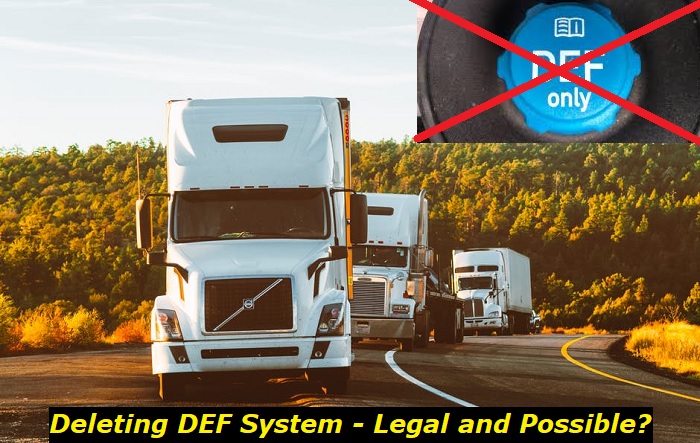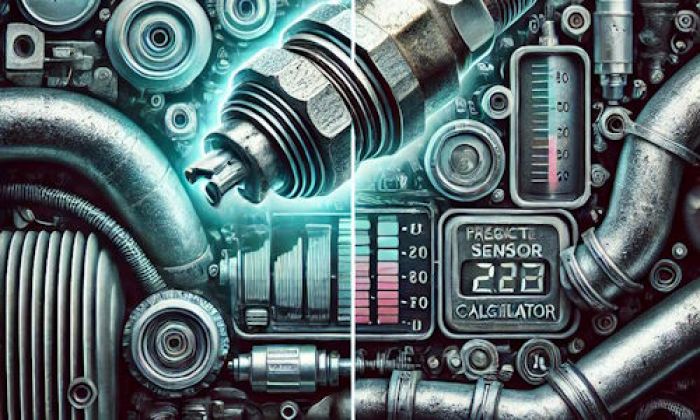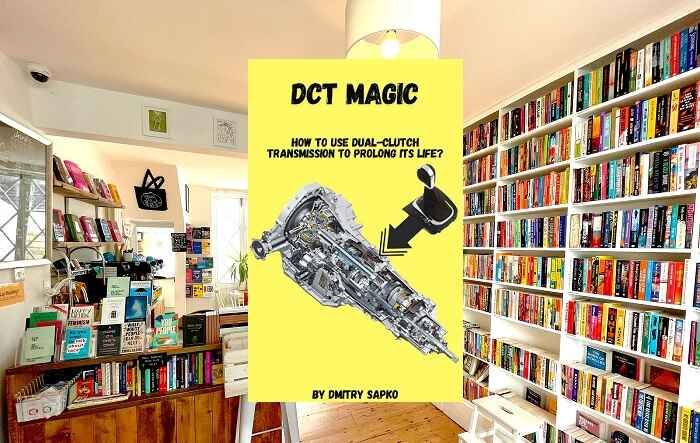Are you considering deleting your diesel engine's DEF (Diesel Exhaust Fluid) system? You may have heard that it can help increase performance, but is it legal and possible to do so? In this article, we explain what could go wrong if you delete the DEF system from your diesel engine. We also provide some tips on how to make sure any modifications are done safely and legally. Read on for more information!
Exhaust upgrades highlights
- Commonreasons:technical issues, power boost, delete
- Average prices:$300 - $3,000
- Average waiting time:1 - 9 days
- Common problems:emission test
- DIY mods:possible but quite complicated
- Level of satisfaction:low

What is the DEF system?
Diesel Exhaust Fluid (DEF) is a urea-based solution that helps to reduce the emissions of nitrogen oxide (NOx) from diesel engines. When injected into an engine's exhaust stream, DEF causes a chemical reaction that converts harmful NOx into harmless nitrates and water vapor. This process is known as Selective Catalytic Reduction (SCR).
In order for SCR to work properly, DEF must be injected into the exhaust system at very specific temperatures and concentrations. To ensure this happens, most modern diesel vehicles are equipped with a DEF system that pumps and monitors the fluid throughout the exhaust system.
This system is made up of a few key components, including a DEF tank, pump and dosing unit, sensor, heater, and filter. The DEF tank stores the solution until it's needed by the engine. When the pump detects that more fluid is required, it will activate and draw from the storage tank to supply the engine.
A sensor monitors fluid concentration and diesel exhaust temperature, which allows the DEF system to know exactly when and how much fluid is needed by the engine. The heater keeps the solution at a constant temperature for maximum efficiency, while the filter ensures that only clean DEF enters the system.
In addition to being equipped with a DEF system, diesel vehicles must also be filled with DEF regularly in order to maintain optimal emissions performance. This can be done at most fueling stations and is an essential step for keeping a diesel vehicle running cleanly and efficiently. By investing in a proper DEF system and filling the tank regularly, drivers can help reduce pollution while taking advantage of the fuel efficiency benefits of diesel engines.
How do you delete your DEF system, and what parts are involved in the process?
Deleting the Diesel Exhaust Fluid (DEF) system is typically done in order to make way for a different emission control device or for other engine modifications. The parts involved in the process include DEF fluid tanks and lines, diesel oxidation catalyst (DOC), selective catalytic reduction (SCR) unit, NOx sensors, dosing valve, and related wiring or tubing.
The first step in the process is to drain the DEF fluid from the tank and lines before disconnecting them. After this, you can then move on to removing the DOC unit, SCR unit, NOx sensors, and dosing valve from their respective locations. Finally, you will need to disconnect any wiring and tubing associated with the DEF system. Once all of these components are disconnected, you can proceed to completely remove the DEF system from your vehicle.
It is important to note that proper disposal of the parts and fluid must be done in order to comply with local environmental regulations. Additionally, the vehicle will likely require a re-tune of its ECU after the DEF system has been deleted in order for it to function correctly. It is recommended that you consult with a professional mechanic or expert before beginning the process.
By following these steps, you can successfully delete your Diesel Exhaust Fluid (DEF) system and replace it with another emission control device or make other engine modifications. Be sure to carry out proper disposal of the parts and fluid and re-tune your ECU accordingly.
Is it legal to delete Diesel Exhaust Fluid System?
In most cases, it is not legal to delete your Diesel Exhaust Fluid (DEF) system. The DEF system is mandatory for most diesel engines, and its purpose is to reduce emissions of nitrogen oxides, which are harmful pollutants. Removing the system will significantly increase these emissions.
Depending on where you live, this could result in a violation of local law or regulations, and you may be subject to penalties. It is also worth noting that many diesel engines are designed to not run correctly without the DEF system in place, so deleting it could cause your engine to malfunction or even fail completely.
For these reasons, we recommend against deleting a Diesel Exhaust Fluid System. If you believe your DEF system is not functioning correctly, it is best to have it inspected and repaired by a qualified technician.
You will also need to go through a recertification process if you choose to delete your DEF system. This involves submitting an application and having a technician inspect the vehicle, as well as its associated systems, to ensure that it meets the standards for air quality.
You will need to contact the manufacturer and/or the appropriate regulatory body in your area to find out more information about this process. The recertification process can be rather complex and costly, so it is important to make sure that you understand the requirements before proceeding.
In general, it is important to ensure that your diesel engine is compliant with all relevant emission regulations. Doing so will help protect the environment while also ensuring that your engine runs reliably and efficiently. Remember, if there is any doubt, it's always best to consult a qualified technician.
Furthermore, if you are planning to resell your truck, be aware that some buyers may not accept a vehicle without a DEF system. So, you may want to consider keeping the system in place in order to increase its resale value.
Does deleting DEF void your warranty?
The decision to delete a Diesel Exhaust Fluid (DEF) system could void the manufacturer's warranty. This is because many engines are designed to run correctly only when paired with the DEF system, and deleting it could cause engine damage or failure.
So, it's best to consult with the manufacturer beforehand or speak to a qualified technician if you have any doubts. Additionally, be sure that any aftermarket parts used to replace the DEF system are certified and meet all relevant regulations. This will help ensure that your warranty remains intact while also keeping emissions levels within acceptable limits.
What are the potential benefits of deleting DEF?
Deleting a Diesel Exhaust Fluid (DEF) system from an engine can provide a few benefits. The first is the elimination of additional costs associated with maintaining and refilling DEF tanks. In addition, deleting the DEF system reduces the amount of space taken up by components such as pumps and hoses, which may be beneficial in certain engine applications.
Finally, removing the DEF system can help reduce the amount of engine complexity, allowing for a simpler and more reliable powertrain design. However, it is important to note that deleting the DEF system does not eliminate the need for other emissions control systems, such as diesel particulate filters (DPF).
These systems are still required for engines to meet certain emissions standards. Therefore, deleting the DEF system should only be done with careful consideration of all applicable regulations.
Bottom Line
Deleting a Diesel Exhaust Fluid (DEF) system is not recommended due to legal and safety considerations. In many cases, it can result in a violation of local laws or regulations, voiding of the manufacturer's warranty, and potential engine damage or failure.
If you are considering deleting your DEF system, be sure to consult with a qualified technician or the manufacturer beforehand to make sure all relevant laws and regulations are followed. Additionally, be sure that any aftermarket parts used to replace the DEF system are certified and meet all applicable standards. Doing so will help ensure that your engine remains compliant while also running reliably and efficiently.
About the authors
The CarAraC research team is composed of seasoned auto mechanics and automotive industry professionals, including individuals with advanced degrees and certifications in their field. Our team members boast prestigious credentials, reflecting their extensive knowledge and skills. These qualifications include: IMI: Institute of the Motor Industry, ASE-Certified Master Automobile Technicians; Coventry University, Graduate of MA in Automotive Journalism; Politecnico di Torino, Italy, MS Automotive Engineering; Ss. Cyril and Methodius University in Skopje, Mechanical University in Skopje; TOC Automotive College; DHA Suffa University, Department of Mechanical Engineering






Add comment